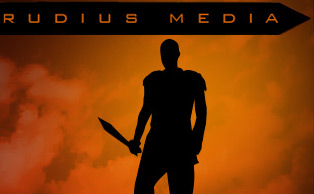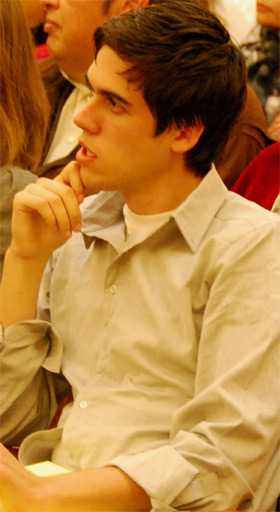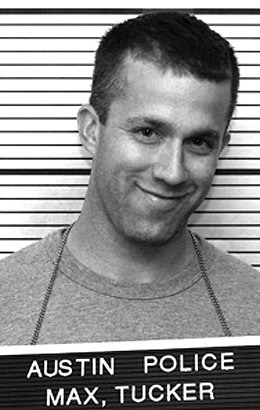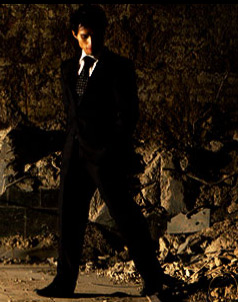 Ben Corman is the Creative Director of Rudius Media. They’re an American web publishing company founded by Tucker Max, who wrote a book called I Hope They Serve Beer In Hell which is being released as a movie in September 2009 (production blog here).
Ben Corman is the Creative Director of Rudius Media. They’re an American web publishing company founded by Tucker Max, who wrote a book called I Hope They Serve Beer In Hell which is being released as a movie in September 2009 (production blog here).
I’ve followed Tucker Max since around 2004. Initially, because I was the typical teenage male attracted to his hedonistic story-telling; lately, because Rudius is an interesting case study as a (mostly) public web media company, given that their staff is largely comprised of writers. Corman is averse to publishing photographs of himself – he was adamant that the graffiti pictured right should be used to depict him – but he took the time to respond at length to my questions about Rudius Media, his role and their future.
How did the opportunity to sign on with Rudius come about?
I sort of fell into it. A couple of months after I joined the messageboard, Donika [Miller, Rudius Editor] and Luke [Heidelberger, Rudius Director of IT] started the Submitted Stories board and, being that I wasn’t doing much with my time, I started writing short stories to get posted there. I’d always (sort of) written, but it was hard to sustain any enthusiasm for it without having anyone to read my stuff. That board was great because for the first time my work was getting put in front of an audience who didn’t give a shit about me and would give me honest feedback.
Donika noticed me and offered to help edit my stuff, which was a huge ego boost. It was really nice to have someone say, “hey, this is good and I believe in it.”
I’m not sure what happened after that. I kept writing and about a week before I was supposed to see Tucker speak at UCLA he messaged me about my writing. We went out for drinks after the speech and talked about the company and what he was trying to put together; I told him that I’d love to come on board. I assume that Donika put my name out there as someone with a little bit of writing talent. and it was just luck that we happened to be in the city at the same time.
How does your current role differ from what was described to you at that time?
You assume that I had a role described to me. The night I got myself hired, I’m not sure Tucker ever said what I was going to do. He said something like “I’ll give you something easy to do, just to see how you do at it and to see if you’re a good fit. If you do well, then I’ll give you more work. If you blow it, no harm, but it means you’re not a good fit, and we’ll go our separate ways.”
The first thing I did was some transcription work for Robert Greene’s site. Then after that I started editing a few of the projects that we had going at the time. I was just happy to be a part of the company; we never really had things like job descriptions or roles.
How do you describe the company and your role when you meet new people?
 I sort of evade the question when I meet new people. For most people, what they do to pay the bills and what they’re really passionate about are two separate things. I like to get right at what they’re passionate about, because that’s always more interesting than the sort of small talk that surrounds “so what do you do?”.
I sort of evade the question when I meet new people. For most people, what they do to pay the bills and what they’re really passionate about are two separate things. I like to get right at what they’re passionate about, because that’s always more interesting than the sort of small talk that surrounds “so what do you do?”.
Usually, when the question comes up, I say I work for a start-up media company and I’m the creative director of the literary side. That’s enough of a mouthful that most people nod without knowing what that really means.
Don’t get me wrong. I’ll talk all day about writing, but only because I find that sort of thing really engaging. And there are parts of my job that I really like discussing, like how the internet has changed content distribution, or what it takes to make a living as an artist. But those topics are usually divorced from the discussion of what I do professionally. Most people have some sort of creative outlet, whether it’s DJing or coding or climbing or writing or photography. It’s easy to have a wide-ranging discussion about those interests without it having to be bogged down with talk about the day job.
Do you find that people tend to have difficulty accepting what appears to be a relatively unclassifiable, ‘new media’ company? Do you find yourself oversimplifying your role to fit into what people are able to understand?
I think most people don’t know how the movies they watch or the books they read are made, and consequently they don’t really understand the difference between Rudius and a more traditional media company. Which is fine; I don’t expect people to know the ins and outs of either industry, and I certainly didn’t understand the nuances of this business before I worked in it. When I talk about what I do or what Rudius does, they don’t realize that we’re different from the other players out there. Conceptually, their understanding that we’re different stems from us being a start-up and that we’re still trying to establish ourselves in these spaces.
When I talk about what I do and the many hats I wear, it’s in the context of a start-up. People understand that my job can change pretty much on a daily basis, depending on what Rudius needs at the moment. So I don’t ever really have to simplify what my job is. I do whatever needs to be done.
People are more interested in the fact that we’re a start-up and that I work from home, than what I actually do day-to-day. In some ways I live the dream. I don’t have to worry about making it into an office. I don’t have hours to keep. I travel a lot. As long as the work gets done, everyone is happy. I think a lot of people would prefer the system we have over the traditional eight hour work day.
When you first met Tucker, did he buy you a copy of [Robert Greene’s] 33 Strategies Of War like he did for Ryan Holiday? [a fellow Rudius writer, pictured below right]
 Nope. But Tucker has this amazing library that I’ve borrowed more of my fair share of books from. For a while I was reading like a book a week out of it. And he has this habit of ordering books twice, so I’ve been able to get a number of free books that way.
Nope. But Tucker has this amazing library that I’ve borrowed more of my fair share of books from. For a while I was reading like a book a week out of it. And he has this habit of ordering books twice, so I’ve been able to get a number of free books that way.
When I first met Tucker, I knew he was a Robert Greene fan, so I lied and said that I’d read all his books and was a huge fan myself. Things probably would have turned out the same, I’d have still gotten the job, if I’d been honest but I was reaching that night because I really wanted to work with Tucker. And once that lie was on the table, I had to go back and read Robert Greene. I was too poor to buy the actual books, so I blew off studying for my finals and spent the next week in the UCLA bookstore reading Robert Greene’s work.
In “I’m With The Band“, you wrote: “And if you already think I’m an asshole this is where you should probably stop reading.” Can you explain that line? Why the pre-emptive self-defense?
I was trying to say that I realize how ridiculous it is to complain about a positive. I’m aware that what’s coming is going to be good for all of us. If the movie [I Hope They Serve Beer In Hell] does well, we’ll be in a great place. We’ll have resources, we’ll be able to work the artists we want to work with, and we’ll have our pick of projects.
A lot of people are going to look at what’s coming and think I’m crazy to miss the days when we were run out of a living room. And they’re probably right. I assume that things only get better from here on out and that I’ll have more opportunities going forward. Which is why I feel like an asshole writing that I’ll miss it. But Rudius has been such a big part of my life over the last few years that I can’t help but feel something now that we’re about to undergo this huge change.
In September 2008, you took a hands-on approach to updating the Rudius Media homepage with new content almost-daily. What was the strategy behind this decision? Has it succeeded, or is it too early to tell?
As we’ve grown and added sites and as some authors have fallen off from writing, we’ve not done a very good job showcasing who is writing and where the newest and best content is. The change was supposed to (in some small way) address that shortcoming, and give readers an easy way to stay on top of what’s happening in the Rudius universe. In looking around at Rudius Media, it was a pretty big oversight that a new media company wouldn’t have a portal for it’s own content.
It was also the first part of a larger strategy to redesign the sites. I had hoped that we’d be able to get that redesign done this year, but because of the budget, it looks like that’s going to have to wait until 2010. I want to make Rudius Media more of a community instead of each site having it’s own little fiefdom. So we’re looking at features such as single login that will allow a reader to comment on any of the sites as well as log into the messageboard, dynamically updating blog rolls that show which sites have been updated and where the latest content is and the ability for our readers to interact with each other through profiles and other such web magic.
It’s really too early to tell if all of this will be a success or not as the changes to the Rudius Media site are just the small first step. There should be a lot of cool stuff happening next year.
How do you deal with procrastination? Have your work habits improved of late?
I used to just throw myself at the day with this sort of checklist mentality. So if I wanted to update the blog, I’d just sit there first thing in the morning and sort of command myself “ok, now write.” Or if it was midnight but I had some editing to do, I’d sit down and try to edit. As a result, I’d just be super unmotivated to actually do the task in front of me. so I’d waste time on the messageboard or on my RSS reader.
I’ve found that I’m better at certain tasks depending on the time of day. So mornings I can deal with the tech side and keeping the servers alive, usually over breakfast. Afternoons I usually spend on the content side; editing, looking at author applications, reading my RSS reader. And I’m better at writing post-8pm. So now I just block my day off into three-hour blocks and I just stay with whatever task I’m on for those three hours.
It has the advantage of not feeling like I’m going to spend my whole day on one task and since I know, “okay, I’ve got three hours to get this done.”
I also tracked myself for a week to see where I was wasting time. I realized that keeping my email open all the time was a huge problem, because every new email was an interruption to what I was doing. Now I only check it once an hour or so, whenever the natural breaks in whatever I’m working on come.
The bigger problem though was my RSS reader. It’s easy to lose a whole day just sort of mindlessly reading articles and tagging them in del.icio.us. Now, if I find myself doing that, I make a conscious effort to close it and get back to whatever I should be working on.
How do you define your business relationship with Tucker [pictured below left]? Do you consider him a mentor?
 He’s my boss and the owner of Rudius Media.
He’s my boss and the owner of Rudius Media.
He’s not a mentor in the sense that he’s looking over my shoulder and giving me advice or direction but he’s always been there as a resource. And as I’ve tried to learn everything I can about this business, it’s been invaluable having him there to bounce questions off of. A lot of what I’ve been trying to learn, he pioneered with TuckerMax.com, and so when I’m not sure exactly what the next step is, I can go ask him, “What do I need to do here?”
I’ve noticed that most people who comment on your blog entries tend to write something like “oh yeah I can totally relate, this is just like what happened to me”, before they go on to describe a similiar experience they had. I notice this happens a lot on Ryan’s blog, too. Maybe it’s a wider blog phenomenon, but it seems really concentrated on the Rudius sites. Does this kind of reaction to your writing bother you?
Not really. I’m usually so happy that people are reading and commenting that unless someone is obviously trolling, I’m happy that they’ve taken the time to hang out at my site. It’s not like I know my readers; they have no obligation to me to keep coming back and reading what I have to say. But they do, and that’s incredibly rewarding. That they then want to share their experiences is pretty cool.
There’s all these articles out there about narcissism, and about how blogging and Twitter and everything else is just an extension about how narcissistic we’ve gotten as a society. I’m sure there are elements of that out there, but for the most part, I think people blog and Twitter and share on flickr and goodreads and del.icio.us and messageboards because they’re looking for a connection with other people. I don’t see it as narcissism, but as us really trying to connect by saying “here’s what I’m about”, and seeing if that resonates with other people.
Yeah, the downside is that there are a lot of people blogging about their cats, but you know what? If that person has twelve readers, I bet there’s a cool little vibe happening where they all get to just geek out about their love of cats. It’s easy to shit all over that, but most people aren’t trying to do this for a living; they just want to find other people who share their hobbies and passions.
So if my writing connects with someone where they want to share their experiences back, I’m not sure how that could bother me.
Since I began reading your site a couple of years ago, I found it frustrating how little you discussed the day-to-day working for Rudius Media. It’s great that you’ve recently started to write more about that side of your life.
I tend to write about what’s going on in my life and what I find interesting at the moment. With the movie tour coming up and with the movie site about to go live, Rudius has definitely been on my mind. But it hasn’t been a conscious decision to write more about my work, or what happens day-to-day. When I sit down to write, there’s no real decision like “I have to go in this direction.” I just write about whatever happens to be on my mind at the moment.
If you like the day-to-day Rudius stuff, there will be a lot more of it coming up. I’ll be on the movie tour, and I plan to write every day, sort of what I did with the Panama trip. So look for that.
What are your goals with the non-fiction element of BenCorman.com? [site banner pictured below right – dude in suit isn’t Ben]
 I wish I had goals for the site. A few months ago, when I was having trouble writing post-Panama, I sat down and spent a few weeks mapping out my next novel. I’ve got a notebook full out outlines and character profiles and everything else that goes into a really big project. And for a few weeks I sort of nibbled around the edges, filling in parts of the outline or writing scenes, but not doing any of the heavy lifting.
I wish I had goals for the site. A few months ago, when I was having trouble writing post-Panama, I sat down and spent a few weeks mapping out my next novel. I’ve got a notebook full out outlines and character profiles and everything else that goes into a really big project. And for a few weeks I sort of nibbled around the edges, filling in parts of the outline or writing scenes, but not doing any of the heavy lifting.
Then I had a pretty rough weekend and wrote about it in the entry about my grandmother dying (“January 22nd, 1917 – July 3rd, 2009“), and ever since then, the words have sort of tumbled out and on to the page. So I put the novel away for a bit, and I’m just going to ride this for as long as it’s fun and it’s working for me.
I go through these periods where writing comes really easily and I have a lot to say; that’s when I really just love doing it. But as to where it’s headed or what the plan is, it’s pretty undefined. Just: do this, and see if people respond to it.
It’s actually a dumb plan. I should be working on the novel non-stop so that it’s ready when we’re a big bad player in Hollywood.
What do you hope others get out of your writing on the site?
I hope people are entertained. Growing up, I read a lot. Even now, there’s nothing I like more than just killing half a day getting lost in a really good book. I don’t think my own writing is that strong yet, where people will just get lost in it for hours, but I hope that they sort of lose themselves in what I have to say – for a few minutes, at least.
Finally, how do you feel about being interviewed?
It’s harder than it looks in the movies. Like anything else, there’s this pressure to be engaging, to be funny, to be honest, all while still maintaining that fiction that I’m cool enough to be interviewed.
I really hate reading interviews with people that I respect that are boring, because it feels like they’re not trying. That’s probably selfish of me, to want more than they’re willing to give. But now, being on the other side of the table … it feels like you’ve given me the chance to say something, and you’ve opened your audience to me. I want to respect that.
So much of this blogging shit is just a shell game: it’s creating content because the template is to update (x) times a week on Y subject, and link bait sites A, B and C. In my own writing, I’m trying to get past that. I’m trying to create the kind of stuff I’d want to read, and not just create content because I need to hit that content template.
So I’d feel really shitty if I just mailed it in with two line answers. But it’s fun too. And I can only hope that this interview turns out to be entertaining, or that someone gets something out of this.
Ben Corman updates the RudiusMedia.com homepage most days, and writes mostly non-fiction at BenCorman.com. He’s joined Tucker Max’s movie tour in the lead-up to its September 2009 US release, which Tucker has blogged about extensively here. Contact Ben via his site or Twitter.
Dean and Jess, a couple of Yatala regulars, are lounging on a mattress in the back of their station wagon. How does tonight compare to previous outings? “It’s cold,” Dean says. “That’s about it!” We all laugh. His mother once worked for the defunct Richlands Twin Drive-In Theatre. After getting his driver’s licence, Dean and his mates often spent weekend nights within these very grounds. “We like coming here. It’s peaceful. You get to lie back,” he says, gesturing at the mattress.


 I sort of evade the question when I meet new people. For most people, what they do to pay the bills and what they’re really passionate about are two separate things. I like to get right at what they’re passionate about, because that’s always more interesting than the sort of small talk that surrounds “so what do you do?”.
I sort of evade the question when I meet new people. For most people, what they do to pay the bills and what they’re really passionate about are two separate things. I like to get right at what they’re passionate about, because that’s always more interesting than the sort of small talk that surrounds “so what do you do?”. Nope. But Tucker has this amazing library that I’ve borrowed more of my fair share of books from. For a while I was reading like a book a week out of it. And he has this habit of ordering books twice, so I’ve been able to get a number of free books that way.
Nope. But Tucker has this amazing library that I’ve borrowed more of my fair share of books from. For a while I was reading like a book a week out of it. And he has this habit of ordering books twice, so I’ve been able to get a number of free books that way. He’s my boss and the owner of Rudius Media.
He’s my boss and the owner of Rudius Media. I wish I had goals for the site. A few months ago, when I was having trouble writing post-
I wish I had goals for the site. A few months ago, when I was having trouble writing post-